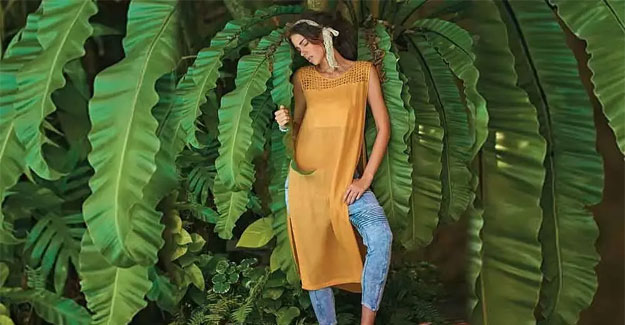
The Fashion Industry Is Moving Towards Sustainability
The textile and fashion industry is today known to be the second largest polluting industry in the world. Fortunately, as awareness grows, consumers, large retail brands, NGOs, leading designers are all coming together towards reducing fashion's carbon footprint through sustainable initiatives. This World Earth Day, let us understand what we can do to ensure that our fashion choices do not harm mother nature. How can a consumer know who is making his fabric/fibre and is he following right steps to ensure least environmental impact? Can this knowledge help him in protecting the environment. Do consumers have the right to know who made my clothes, where are they coming from and how much impact they are making on the environment? Because if consumers demand this, more and more brands and manufacturers would be forced to follow processes which would then lead to least environmental footprint. Some technological innovations are enabling this kind of transparency. In this day and age we have the technology in place to track the full journey of a garment. This 'journey tracing' is enabled by a technology called 'Tracer'. A tracer is a pigment injected at the orgin of the fibre that tracks the full value chain. Leading garment brands display a QR code on their apparel which when scanned tells you the fields and factories that the fibre/fabric originated from and travelled. Today, as a consumer, you can demand this transparency and force the brands and manufacturers to source and follow eco-friendly measures. Armed with this information on brands and manufacturers, the customer can then visit the websites of these manufacturers and brands and check if they have endorsements from non-governmental organisations (NGO's) like Canopy, FSC, SAC and Changing Markets Foundation to name a few. All these NGOs are like a gold hallmark. They have certain strict norms laid down and they visit brands and factories to ensure compliance on some pre-defined land, water and air pollution parameters. Recently,the Aditya Birla Group launched a fabric called Livaeco that has a Tracer in it. Livaeco fabric can be identified by a tag displayed on the garment. These garments available at leading brands, have full value-chain transparency. Many designers like Gabriella Demetraides, Gavin Miguel, have collaborated and used this fabric in their collections. There is still a long way to go as far as sustainability in textile is concerned, especially in the current context rife with fast fashion and hedonistic consumption, But as they say, every little step counts. Leading brands and companies have already started making changes. Consumer awareness and demand for more transparency and information on the clothes they wear can further accelerate the process. Water pollution is one of the side effects of the fashion industry. It's important to treat the water off the chemicals and dyes before releasing it in the environment. Now, with technological changes and modifications in the processes, brands can reduce their water consumption as well. Denim is one of the most water intensive industries, however, homegrown brands like Spykar Lifestyles are taking initiatives to make the supply chain and production processes more sustainable. The brand also strives to lower the consumption of natural resources like fuel for energy and water. The chemicals used are bio-degradable and non-hazardous. Spykar's denims are produced in a government approved facility. All denims that Spykar rolls out are made using environmentally responsible processes right from recycled cotton, washes that require less water to technologically advanced dry processes such as laser techniques. The brand uses solar power and relies heavily on laser machines, ozone wash technology and cloud wash, that has aided the brand to lower the material to liquid ratio considerably. Additionally, Spykar is among the few brands that refrains from using pumice stone while washing, to not disturb the depleting pumice belt. The brand also has a fully functional water treatment plant which ensures no polluted water is released into any natural water source. The water is re-treated/purified and re-used for washing. This World Earth Day, let us pledge to do our bit towards the environment!
Textile Excellence
If you wish to Subscribe to Textile Excellence Print Edition, kindly fill in the below form and we shall get back to you with details.












